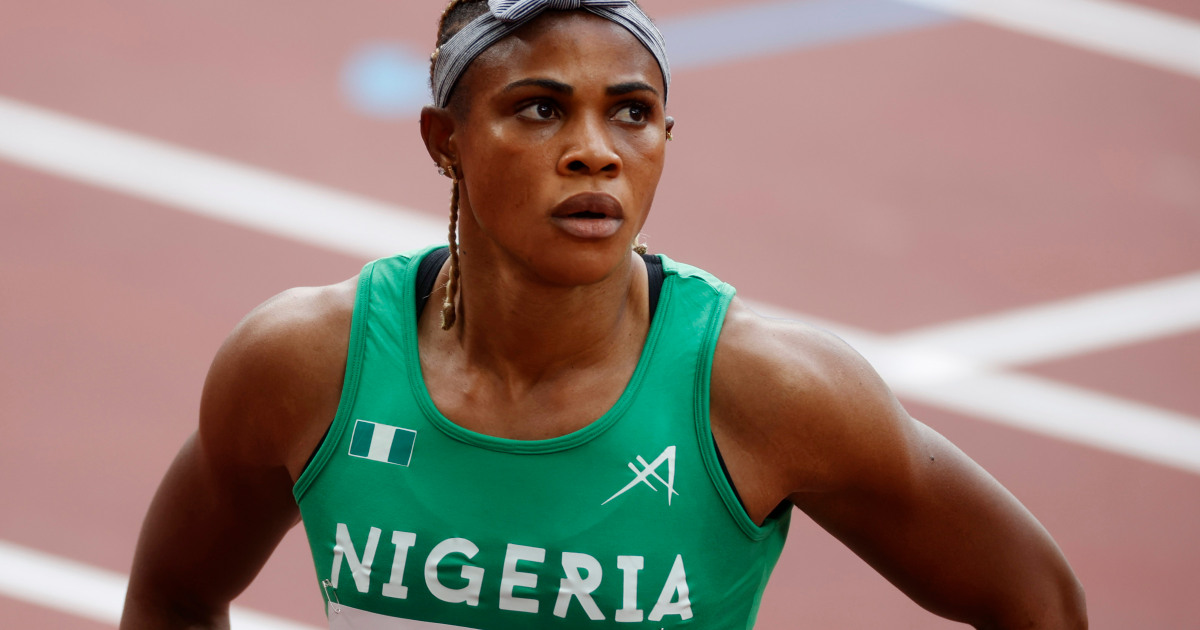Sprinter provisionally suspended hours before she was due to run in the semi-finals of the women’s 100 metres.
Nigerian sprinter Blessing Okagbare has been provisionally suspended for doping just hours before the former World Championships silver medallist was due to run in Saturday’s semi-finals of the women’s 100 metres at the Olympics.
Okagbare tested positive for human growth hormone in an out-of-competition test on July 19, four days before the Olympics opened, the Athletics Integrity Unit (AIU) said, prompting a mandatory provisional suspension.
The results of that test were received by the track and field’s anti-doping body only late on Friday and after Okagbare had already run in the 100 metres heats on the opening day of track competition at the Olympic Stadium in Tokyo, the AIU said.
The AIU informed Okagbare of her suspension on Saturday morning, it said, ruling her out of the 100 metres and likely ending her Olympic campaign.
Under doping regulations, she is allowed to request that a “B” sample – or backup sample – is tested to double-check the results.
The 32-year-old Okagbare won a silver medal in the long jump at the 2008 Beijing Olympics and at the 2013 World Championships.
I have said it before and I will say it again. If you do not know the sport, not passionate about it/Us (the athletes), then you have no business there as an administrator. The sport system in Nigeria is so flaw and we athletes, are always at the receiving end of the damages..
— Blessing Okagbare MFR (@mountain214) July 29, 2021
She also collected a bronze in the 200 metres at the 2013 World Championship in Moscow behind Shelly-Ann Fraser-Pryce, who is the favourite for the 100 metres title in Tokyo. Okagbare did the 100-200 double at the 2014 Commonwealth Games.
Okagbare’s suspension came three days after the AIU announced that 10 track and field athletes from Nigeria were among a group of 20 from various countries who were disqualified from competing at the Olympics because they had not met minimum doping test requirements.
The AIU did not name any of those athletes.
Nigeria is considered a high-risk country by the AIU because of a brittle anti-doping programme. Because of that, Nigerian athletes must have at least three out-of-competition tests in the 10 months before a major championship.
The AIU has provisionally suspended Blessing Okagbare of Nigeria, with immediate effect after an out-of-competition sample collected from the sprinter tested positive for human Growth Hormone, a prohibited substance on the 2021 WADA Prohibited List.
https://t.co/qjMyEDfwTY pic.twitter.com/c4opDQdccv
— Athletics Integrity Unit (@aiu_athletics) July 30, 2021
Nigeria was moved into the high-risk category last year when the problems with its anti-doping programme were described as “very serious” by AIU Chairman David Howman.
Some Nigerian athletes who said they were among those barred from the Olympics by the AIU protested on the streets of Tokyo this week. They held up signs claiming Nigerian sports and anti-doping authorities were responsible for them not meeting the testing criteria.
Kenya dropped two runners from its Olympic team just before the Tokyo Games opened because they had not undergone enough out-of-competition tests in the buildup to the Olympics.
